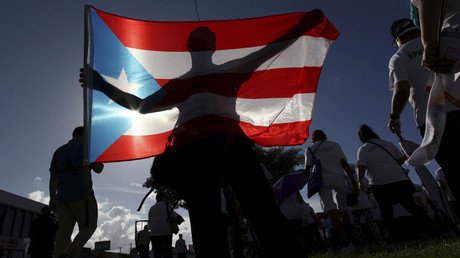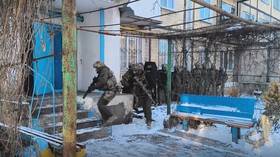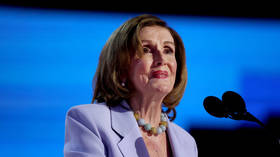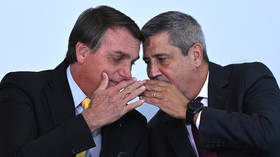Puerto Ricans to vote between statehood & independence
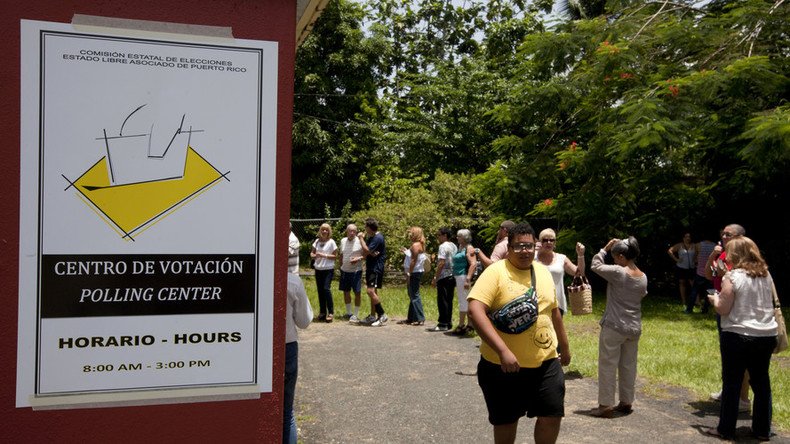
Puerto Rico is preparing to vote on becoming the 51st US state, but there are several other options that the islanders can choose from in the non-binding referendum, including maintaining the status quo to becoming a full-fledged country on its own.
Amid a historic bankruptcy declaration, Puerto Ricans will head to the polls on Sunday to reexamine the island’s relationship with the United States.
The options are to maintain Puerto Rico’s status as a commonwealth, become the 51st state in the Union, become a “free association” state, or declare independence and take full control of its governance for the first time in its history.
The conquistador Juan Ponce de Leon began Spain’s settlement on the island in 1508, and it remained a Spanish colony and military outpost until the Spanish-American War in 1898, when it came under US sovereignty.
In 1917, Puerto Ricans were granted United States citizenship. Public Law 600, a 1950 federal law, authorized the island’s residents to draft and adopt their own Constitution, which they did in 1952. At that point, Puerto Rico gained commonwealth status. The question voters face now is: what they want the status of the island to be going forward.
So you want to maintain your current status
As a commonwealth of the US, Puerto Rico enjoys the same common defense, market and currency as the 50 states. However, residents cannot vote in federal elections, though they do vote in presidential primaries. They have a non-voting resident commissioner who speaks for Puerto Rico in the House of Representatives.
Residents do not pay federal income tax on money earned on the island; the Social Security tax is collected based by mutual consent between the US and Puerto Rican governments. Many federal assistance programs have separate, but similar versions for the island.
In Puerto Rico school's out... Of money. https://t.co/9LCBb0xbvt
— RT America (@RT_America) May 6, 2017
So you want to be the 51st state
Although Puerto Rico previously voted against statehood in 1967, 1993 and 1998, a majority of voters opted for it in 2012 in a referendum that didn’t go anywhere. This is the option that is expected to win on Sunday. If it does, it would follow the steps in what’s known as the Tennessee Plan to becoming a state. Puerto Rico would send a congressional delegation to Washington demanding a seat for two senators and five representatives chosen by the governor.
Although the Republican Party, which controls both chambers of Congress, has paid lip service to Puerto Rican statehood in its national platform since the 1940s, it is expected to block any attempt by the island to join the union because Puerto Ricans generally tend to support Democrats.
DETAILS: #PuertoRico austerity package passed in a bipartisan 68-30 vote https://t.co/p60fuLyKz7pic.twitter.com/tPeqXilIpW
— RT America (@RT_America) June 29, 2016
The benefit of statehood is that Puerto Rico would gain federal money on programs to help the island’s bankrupt economy. The drawback is that residents would have to pay individual and corporate taxes, just like those of any other state.
"We wouldn't want a bailout. I'm no fan of bailouts. I think we need to assume responsibility for what's going on here," Governor Ricardo Rossello (D-Puerto Rico) said. "Statehood is much more than resources. Statehood is an equal playing field for US citizens that reside on the island."
Vice President Mike Pence supports Puerto Rican statehood, Resident Commissioner Jenniffer Gonzalez (R-Puerto Rico) said after meeting with him several months ago, CNBC reported.
So you want to enter ‘free association’
If voters opt for this international political status, Puerto Rico would join the Federated States of Micronesia, the Marshall Islands and Palau as nations that sign a compact of free association with the United States. The treaty would be recognized under international law as a sovereign, democratic, self-governing and decolonizing status short of full independence. It lasts only as long as the agreement of association remains in effect. The three current compacts are renegotiated every five years.
There is a large difference between Puerto Rico and the three nations that are part of the Trust Territory of the Pacific Islands that the compact of free association would need to address, Ramon Luis Nieves wrote in an op-ed in favor of free association. The three Pacific countries were never under US sovereignty and, as such, their citizens have never been considered US citizens.
“Continued transmission of US citizenship is an essential issue. There are no constitutional obstacles for Puerto Ricans born after free association to continue their century-old citizenship status,” he wrote for The Hill. “Political will is Congress’s sole barometer on this matter.”
The pro-statehood PR51st group warns, however, that there is a big downside to such an association. The US would likely not grant a temporary visa waiver program “in the age of terrorism,” so Puerto Ricans would be “subject to deportation from the US as undesirable aliens for public health protection if they carry infectious disease, crimes, public welfare dependency, or lack visible means of support.”
The new documentary, ‘#PuertoRico: Anger on the island,’ airs tonight at 6:30 PM EST on RT https://t.co/pjK42jFmIV
— RT America (@RT_America) May 22, 2017
So you want to be the 196th (or so) country
Puerto Ricans could opt for independence, though it is highly unlikely they would do so. Only six percent of voters opted for independence in 2012. The island would be responsible for its own military defense, civil defense, and police. Puerto Rico would also be responsible for funding all aspects of its government and island residents would lose their US citizenship.
"What people have to understand about the need for independence is that there's a fear that's been instilled on the people in Puerto Rico that if we were independent we couldn't run our own country," activist Rosa Clemente, the 2008 vice presidential nominee for the Green Party, told CNN.
Proponents argue, though, that much of the island’s financial woes are due to its colonial status and patrician attitudes in Washington.
“Puerto Ricans must adhere to laws passed by a government in which they do not participate,” Maru Gonzalez wrote in an op-ed for Huffington Post. “Independence would grant Puerto Rico a platform to address the debt crisis on its own terms and afford the island’s 3.5 million inhabitants the right to self-determination.”
